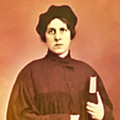Further reading
- Shiller, Romy. "Rabbis 2015: Lisa Grushcow". The Forward .
- Stoll, Ira (July 17, 2019). "New York Times Touts 'Gay and Once Divorced' Rabbi". Algemeiner Journal .
| Pre-modern figures |
| |||||
|---|---|---|---|---|---|---|
| Modern figures |
| |||||
| Alternate rabbinical roles | ||||||
| Organisations and midrashot | ||||||
| | This biographical article about a Canadian rabbi is a stub. You can help Wikipedia by expanding it. |
